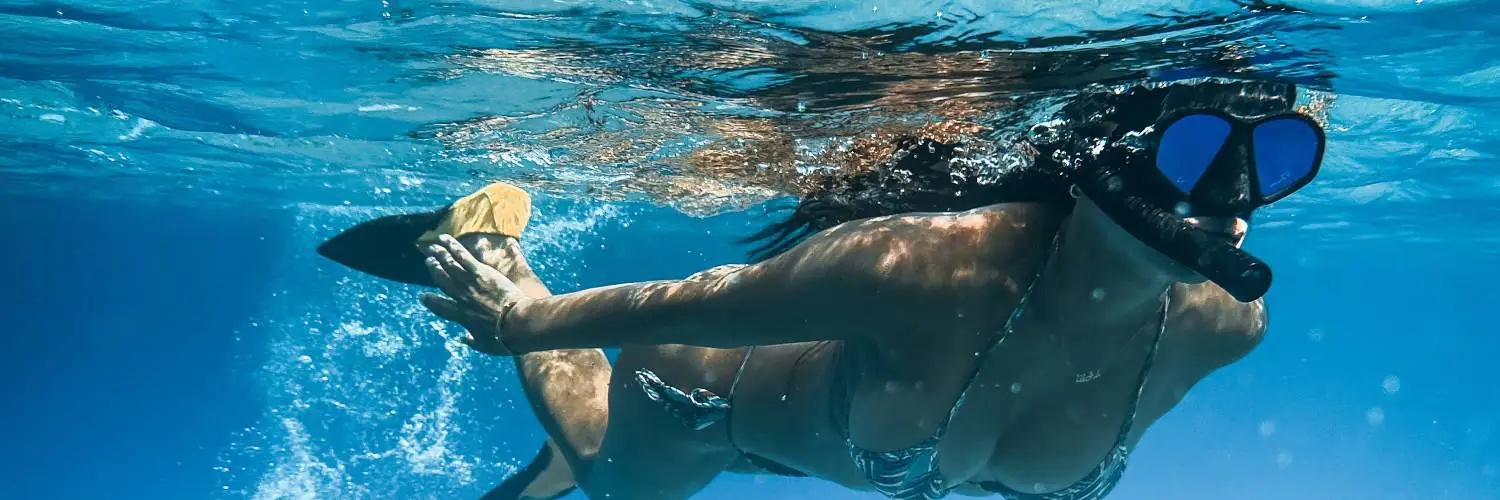Table of Contents
Snorkeling with a Heart Condition: Safe Practices and Health Tips
Snorkeling, an aquatic activity enjoyed by many for its simplicity and the beauty it unveils beneath the surface of the water, is generally considered safe for people of all ages. However, like any physical endeavor, snorkeling poses risks, particularly to individuals with pre-existing heart conditions. While incidents are not common, understanding the implications of heart health on snorkeling safety is crucial for enthusiasts eager to explore marine environments.
Recent studies have indicated that certain traits, such as advanced age and the presence of pre-existing heart conditions, are more prevalent among snorkeling-related drowning victims. The physical exertion associated with snorkeling, along with potential stresses caused by cold water and the excitement or anxiety of the activity, can exacerbate such conditions. Medical experts point out that events like cardiac arrhythmias may occur in the water, leading to dangerous situations where individuals may be found unresponsive.
Snorkelers are advised to assess their fitness levels and to be aware of their health conditions before participating in snorkeling activities. It is important that individuals with known heart issues consult with healthcare professionals about the risks associated with snorkeling. Engaging in snorkeling safely involves not only having the proper equipment but also understanding one’s health limitations to prevent emergencies underwater.
Understanding Heart Conditions
Heart conditions encompass a range of diseases that affect the heart’s structure and function. Understanding the types, symptoms, and the critical need for medical consultation is essential for maintaining heart health.
Types of Heart Disease
Several types of heart disease impact individuals, often with serious health consequences. Coronary artery disease (CAD), caused by the buildup of plaque in the heart’s arteries, is a common type. It can lead to heart attacks when blood flow becomes too restricted. Arrhythmias refer to irregular heartbeats, which can encompass conditions like atrial fibrillation. Heart failure, a chronic condition, occurs when the heart can’t pump blood as well as it should. Other forms, such as hypertension (high blood pressure) and high cholesterol, are known risk factors that can lead to more severe heart conditions.
Symptoms and Diagnosis
- Symptoms of heart disease can vary but often include shortness of breath, fatigue, dizziness, and arrhythmias like a racing heartbeat or heart murmur. More severe signs involve chest pain, also known as angina, and even heart attack, where there’s a sudden blockage of blood to the heart.
- The diagnosis of heart conditions often involves a combination of patient history, physical examination, and diagnostic tests such as an echocardiogram, which provides an ultrasound picture of the heart, or a stress test that evaluates heart function under physical exertion.
Importance of Medical Consultation
Consulting with a physician or cardiologist is critical for anyone experiencing symptoms of heart disease or those with risk factors such as hypertension or high cholesterol. They provide expert guidance, from lifestyle changes to medications and procedures, to manage and treat heart conditions. Early detection and treatment of heart disease are paramount in preventing more severe health conditions and improving outcomes.
Risks of Snorkeling With a Heart Condition
Snorkeling can pose significant risks for individuals with heart conditions due to increased physical stress and the aquatic environment. Two main concerns are the effects of water pressure on the body and the risk factors associated with the ocean setting.
Effects of Water Pressure
When a person with a heart condition enters the water, the pressure exerted on their body increases. This can lead to changes in blood circulation and potentially strain the cardiovascular system. Here are specific ways that water pressure can affect those with a heart condition:
- Increased workload on the heart: The pressure difference may cause the heart to work harder to circulate blood.
- Potential for uneven blood distribution: The immersion may shift blood from the extremities to the chest, which can cause stress in individuals with conditions like Left Ventricle End Diastolic Pressure (LVEDP).
Risk Factors in Aquatic Environments
The aquatic environment presents unique challenges that can exacerbate risks for snorkelers with heart conditions:
- Strong Currents: Currents can quickly lead to exhaustion, increasing the likelihood of a cardiovascular event.
- Cold Water: May cause vasoconstriction, increasing blood pressure and strain on the heart.
- Unexpected Situations: Wildlife, changes in currents, and waves can cause panic, leading to a spike in adrenaline that strains the heart.
Personal factors also contribute to the risk level for snorkelers with heart conditions. Age, obesity, smoking, and a family history of sudden cardiac death all compound the dangers. It is crucial for individuals with any of these risk factors, especially a known heart condition, to consult with a doctor before engaging in snorkeling.
Safety Measures and Precautions
For individuals considering snorkeling with a heart condition, it is crucial to prioritize safety through a thorough health assessment and using the appropriate equipment. This will mitigate risks associated with cardiovascular issues while engaging in the water activity.
Pre-Dive Health and Fitness Assessment
Before engaging in snorkeling, an individual should undergo a comprehensive health and fitness assessment, especially if they have a known heart condition. This evaluation includes but is not limited to:
- Stress Test: It is advisable to conduct a cardiovascular stress test, which helps determine if the heart can handle the physical strain associated with snorkeling.
- High Blood Pressure: Monitoring for hypertension is key. Fluctuations in blood pressure during diving can pose serious risks.
- Medications and Diuretics: Review any medications, especially diuretics that affect hydration and electrolyte balance, which are critical elements when swimming.
- Training: Seek guidance from professionals who provide training specific to snorkeling with a heart condition.
- Swimming Proficiency: Individuals should confirm their swimming skills are adequate for snorkeling to minimize unnecessary strain and fatigue.
Snorkeling Equipment and Safety Gear
Selecting and using the correct snorkeling equipment can enhance safety significantly for those with heart conditions. Essential items include:
- Snorkel Mask: Ensure a proper fit to facilitate comfortable breathing without unnecessary stress.
- Fins: Use fins that are appropriate for one’s skill level and physical abilities to avoid overexertion.
- Wetsuit: A well-fitted wetsuit can aid in buoyancy and provide protection against cooler temperatures that can stress the heart.
- Life Jacket/Flotation Device: For added safety, especially for those with compromised fitness levels, a life jacket or other flotation device is recommended.
- Buddy System: Never snorkel alone. Having a buddy ensures that assistance is available promptly if needed.
By adhering to these tailored safety measures and precautions, individuals with heart conditions can better manage risks when snorkeling.
Best Practices for Snorkelers with Heart Conditions
For snorkelers with heart conditions, safety is a paramount concern. Following best practices catered to their health needs can ensure a delightful and safe snorkeling experience, enjoying the beauty of marine life with minimized risks.
Choosing Appropriate Snorkeling Sites
Individuals with heart conditions should carefully select snorkeling sites. Prefer locations with:
- Calm water: Turbulence can increase physical strain.
- Shallow areas: Aid in easier navigation and reduce the need for extensive swimming.
- Clear water: Enhances visibility, reducing anxiety and the need for strenuous movements.
- Abundant marine life near the surface: This allows enjoyment of coral reefs and fish without the need for freediving.
One should always check the weather forecast before a snorkeling trip to avoid sudden changes that could make swimming hazardous. Novices, particularly those with heart conditions, are advised to choose sites that are well-known for being beginner-friendly.
Snorkeling Techniques and Breathing
Proper technique and breathing are crucial for snorkelers with heart conditions:
- Relaxed breathing: Practice breathing calmly through the snorkel tube; rapid breathing can lead to hyperventilation and associated risks.
- Efficient swimming: Use energy-conserving swimming techniques to prevent unnecessary strain on the heart. Short, regular strokes are preferred over aggressive paddling.
- Buoyancy: Use a snorkeling vest if buoyancy control is a concern, as it can help maintain energy levels and reduce the effort of staying afloat.
Understanding and recognizing one’s limits when snorkeling with a heart condition is vital. It is advisable to snorkel in the company of others and to have a clear way to signal for help, should the need arise.
Emergencies and How to Respond
When snorkeling with a heart condition, it is crucial to recognize early signs of distress and know the immediate steps for emergency response. Monitoring symptoms related to the heart is essential for preventing and responding to emergencies.
Recognizing Signs of Distress
- Symptoms to monitor:
- Unusual fatigue or shortness of breath
- Chest pain or discomfort
- Irregular heartbeat or palpitations
- Dizziness or lightheadedness
Individuals with heart conditions should undergo a stress test before engaging in snorkeling activities to assess their physical capabilities and identify potential risks. They must inform their buddy about their condition, as well as any medications they’re on that could affect their performance or emergency treatment.
Emergency Response and First Aid
-
Immediate Action:
- If a person shows any signs of a heart attack or distress, one must call emergency services (999 or the equivalent) immediately.
- Begin CPR if the person is unresponsive and not breathing normally.
-
Safety Precautions:
- Snorkelers with known heart conditions should always be accompanied by a well-trained buddy.
- Ensure a safety plan is in place, which includes knowing the location of the nearest Automated External Defibrillator (AED).
It’s advised that people with heart conditions consult their doctor before snorkeling and consider the risks of drowning, which increases if proper precautions aren’t followed. Snorkelers should be in good health and have had recent physical training relevant to the activity. Avoiding overexertion, which can lead to severe coughing and other complications, is key to maintaining safety in the water.
After Snorkeling: Monitoring and Continued Care
Following snorkeling activities, individuals with heart conditions need to prioritize post-dive health checks and long-term heart health management. Attention to any changes in one’s physical state and adherence to medical advice are crucial in avoiding serious complications.
Post-Dive Health Checks
After snorkeling, individuals, especially those with heart disease or a history of arrhythmia, should conduct a thorough health evaluation. They should be attentive to symptoms that may indicate heart problems, such as chest discomfort, shortness of breath, or unusual fatigue. Key checks include:
- Blood Pressure Measurement: Elevated blood pressure post-dive might suggest an undetected circulatory issue or excessive strain on the heart.
- Symptom Tracking: Any signs of chest pain, palpitations, or dizziness should be noted and reported to a healthcare provider.
- Pulse Monitoring: Irregular heartbeats post-dive can be a warning sign of arrhythmia or other heart troubles.
Long-Term Heart Health Management
Continuous management of heart health post-snorkeling is essential for individuals with known cardiac conditions. They should follow a heart-healthy lifestyle and regular medical supervision. Important components include:
- Medical Consultations: Regular follow-ups with a cardiologist are vital, especially if any heart-related symptoms were noted after snorkeling.
- Medication Adherence: For those prescribed medications, ensuring consistent intake as directed is fundamental to controlling heart conditions.
- Regular Testing: Scheduled echocardiograms can help detect any changes or permanent damage to heart function.
- Lifestyle Modifications: A heart-healthy diet and avoiding activities that might exacerbate any existing heart conditions are advisable.
This proactive approach to health monitoring after snorkeling ensures not only immediate recovery but also long-term cardiac wellbeing.








